Woody Allen/ USA/ 1979-1985
Available on Blu-Ray now.
This is the second Six Films box set from Arrow Films. Unlike the first, which concentrated on Allen’s slapstick phase, this collection looks at relationships with a more mature eye.
The standout exception to this relationship arc is Zelig (1983), the groundbreaking mockumentary about a man who can metamorphosis into anybody within minutes of meeting them and offers constant surprises throughout with its manipulation of historic film, something Forrest Gump mimicked years later. The film also looks at the ridiculous branding of celebrity. Of the whole set this film has held up the best, perhaps because mockumentary style is far more common now than thirty years ago.
Manhattan (1979) is probably the best-known film here, primarily because of the Gershwin music and the love-letter to New York feel. But it is often forgotten that the film also deals with the relationships between several couples, none of which are perfect. The primary relationship between 42-year old Isaac (Allen) and 17-year old Tracy (Mariel Hemingway) is the one that, watching with a modern eye, feels the most uncomfortable. But Manhattan is precisely about the fact that some people meet by just doing what makes them feel good at that moment, whilst others fret about how things will look and possibly lose the loves of their lives. And who else is better than Allen to verbalise paralysis of their situation?
Allen claims Stardust Memories (1980) is not autobiographical but it is difficult not to disagree. It follows the frustrations of Sandy Bates, (Allen), a film-maker struggling to persuade the studios that he can make more than just comedies. The film starts with a very “Felliniesque”-inspired portion that indicates you’re not in a typical Allen film. This is the introduction to the film that Bates wants to release. His fame also affects his relationships. Confronted by the ghosts of partners past and present he is all the while fending off the superficial attentions of both male and female fans.
A Midsummer Night’s Sex Comedy (1982) is the first ensemble film where Allen is not the lead character, although his character gets all the buffoonery and is the ‘funny’ one. It follows three couples meeting up for a weekend at a country house. As you might expect from Allen films at this period it is still primarily from the male perspective and, despite having an excellent female cast, the women are simply there to fulfill their men’s desires in a dutiful sort of way. This makes the film very dated, unfunny and completely anachronistic.
Broadway Danny Rose (1984) is a return to Allen being the centre of the film as a legendary but hapless promoter of New York talent. This film’s skill lies in allowing Allen to deliver dialogue like he’s a machine-gun and it’s this type of dialogue, of course, which Allen delivers best. Often you can miss the humour unless you really listen. The film follows one of his clients who is a bar room crooner and his mistress, introducing an unrecognisable Mia Farrow as the mistress. As with all of his clients they eventually leave him but Danny Rose has, by then, fallen in love. Again, this film falls under the umbrella of relationships that would be so much easier if they didn’t happen.
The Purple Rose of Cairo (1985) is the only film in the collection that doesn’t feature Allen on screen. It follows waitress Cecilia (Mia Farrow) who loves to escape both her abusive husband and their grinding poverty with visits to the cinema. Everything really gets going when one of the characters on the screen, Tom Baxter (Jeff Daniels), spots her repeated visits to his movie and decides to walk off the screen in order to meet her and have a real life. This results in the complicated situation where Jeff Daniels must play both the fictional character who has left the screen and the actor who has played him all within the world of Woody Allen. Mia Farrow, despite playing a rather mousy character, is absolutely believable and you really want some good luck to come her way. This really is a must see film even if you are not a Woody Allen fan because it is so well written and, unless you have seen it before, the ending is unlike any Allen film up to this point.
This box set succeeds because it is an uncompromising list of what Allen produced. The films themselves are a product of the time in which they were created, some thirty years ago. Some of the topics touched on are contentious and cannot be ignored but we must take into account that Allen’s place in the history of cinematic comedy resists being wiped out. Purchase this box set if you are interested in comedy that requires your full attention.
Note: A copy of the 100-page book which accompanies the films was not available to review.
